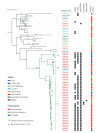Clonal expansion of community-associated meticillin-resistant Staphylococcus aureus (MRSA) in people who inject drugs (PWID): prevalence, risk factors and molecular epidemiology, Bristol, United Kingdom, 2012 to 2017
- PMID: 30940316
- PMCID: PMC6446509
- DOI: 10.2807/1560-7917.ES.2019.24.13.1800124
Clonal expansion of community-associated meticillin-resistant Staphylococcus aureus (MRSA) in people who inject drugs (PWID): prevalence, risk factors and molecular epidemiology, Bristol, United Kingdom, 2012 to 2017
Abstract
Background: In 2015, Bristol (South West England) experienced a large increase in cases of meticillin-resistant Staphylococcus aureus (MRSA) infection in people who inject drugs (PWID).
Aim: We aimed to characterise and estimate the prevalence of MRSA colonisation among PWID in Bristol and test evidence of a clonal outbreak.
Methods: PWID recruited through an unlinked-anonymous community survey during 2016 completed behavioural questionnaires and were screened for MRSA. Univariable logistic regression examined associations with MRSA colonisation. Whole-genome sequencing used lineage-matched MRSA isolates, comparing PWID (screening and retrospective bacteraemia samples from 2012-2017) with non-PWID (Bristol screening) in Bristol and national reference laboratory database samples.
Results: The MRSA colonisation prevalence was 8.7% (13/149) and was associated with frequently injecting in public places (odds ratio (OR): 5.5; 95% confidence interval (CI):1.34-22.70), recent healthcare contact (OR: 4.3; 95% CI: 1.34-13.80) and injecting in groups of three or more (OR: 15.8; 95% CI: 2.51-99.28). People reporting any one of: injecting in public places, injection site skin and soft tissue infection or hospital contact accounted for 12/13 MRSA positive cases (sensitivity 92.3%; specificity 51.5%). Phylogenetic analysis identified a dominant clade associated with infection and colonisation among PWID in Bristol belonging to ST5-SCCmecIVg.
Conclusions: MRSA colonisation in Bristol PWID is substantially elevated compared with general population estimates and there is evidence of clonal expansion, community-based transmission and increased infection risk related to the colonising strain. Targeted interventions, including community screening and suppression therapy, education and basic infection control are needed to reduce MRSA infections in PWID.
Keywords: Community acquired infections; Community acquired infections epidemiology; Community acquired infections microbiology; Drug users; Injecting drug use; Intravenous; Intravenous: complications; Intravenous: microbiology; MRSA; Meticillin-Resistant Staphylococcus aureus; Sepsis; Sequence Analysis, DNA; Staphylococcal Infections/transmission; Staphylococcal epidemiology; Substance Abuse; Substance-Related Disorders/complications; Substance-Related Disorders/microbiology; United Kingdom; Whole-genome sequencing.
Conflict of interest statement
Figures
Similar articles
-
International travel as source of a hospital outbreak with an unusual meticillin-resistant Staphylococcus aureus clonal complex 398, Denmark, 2016.Euro Surveill. 2019 Oct;24(42):1800680. doi: 10.2807/1560-7917.ES.2019.24.42.1800680. Euro Surveill. 2019. PMID: 31640842 Free PMC article.
-
Healthcare-associated outbreak of meticillin-resistant Staphylococcus aureus bacteraemia: role of a cryptic variant of an epidemic clone.J Hosp Infect. 2014 Feb;86(2):83-9. doi: 10.1016/j.jhin.2013.11.007. Epub 2013 Dec 21. J Hosp Infect. 2014. PMID: 24433924 Free PMC article.
-
Circulation of a community healthcare-associated multiply-resistant meticillin-resistant Staphylococcus aureus lineage in South Yorkshire identified by whole genome sequencing.J Hosp Infect. 2019 Dec;103(4):454-460. doi: 10.1016/j.jhin.2019.08.006. Epub 2019 Aug 10. J Hosp Infect. 2019. PMID: 31408690
-
Methicillin-resistant Staphylococcus aureus: the European landscape.J Antimicrob Chemother. 2011 May;66 Suppl 4:iv43-iv48. doi: 10.1093/jac/dkr076. J Antimicrob Chemother. 2011. PMID: 21521706 Review.
-
Methicillin-resistant Staphylococcus aureus intracranial abscess: An analytical series and review on molecular, surgical and medical aspects.Indian J Med Microbiol. 2018 Jan-Mar;36(1):97-103. doi: 10.4103/ijmm.IJMM_17_41. Indian J Med Microbiol. 2018. PMID: 29735835 Review.
Cited by
-
Staphylococcus aureus injection drug use-associated bloodstream infections are propagated by community outbreaks of diverse lineages.Commun Med (Lond). 2021 Nov 30;1:52. doi: 10.1038/s43856-021-00053-9. eCollection 2021. Commun Med (Lond). 2021. PMID: 35602233 Free PMC article.
-
Epidemiology of acute infections in people who inject drugs in Australia.Drug Alcohol Rev. 2024 Jan;43(1):304-314. doi: 10.1111/dar.13772. Epub 2023 Nov 23. Drug Alcohol Rev. 2024. PMID: 37995135 Free PMC article. Review.
-
Outbreak investigation including molecular characterization of community associated methicillin-resistant Staphylococcus aureus in a primary and secondary school in Eastern Switzerland.Sci Rep. 2022 Nov 18;12(1):19826. doi: 10.1038/s41598-022-24363-7. Sci Rep. 2022. PMID: 36400917 Free PMC article.
-
Drug preparation, injection-related infections, and harm reduction practices among a national sample of individuals entering treatment for opioid use disorder.Harm Reduct J. 2024 Jan 19;21(1):16. doi: 10.1186/s12954-024-00939-6. Harm Reduct J. 2024. PMID: 38243269 Free PMC article.
-
Clinical impact and public health challenges of a PVL-MRSA bacteraemia outbreak amongst people who inject drugs in South Yorkshire, UK.Access Microbiol. 2024 Feb 8;6(2):000642.v3. doi: 10.1099/acmi.0.000642.v3. eCollection 2024. Access Microbiol. 2024. PMID: 38482361 Free PMC article.
References
-
- Bal AM, Coombs GW, Holden MTG, Lindsay JA, Nimmo GR, Tattevin P, et al. Genomic insights into the emergence and spread of international clones of healthcare-, community- and livestock-associated meticillin-resistant Staphylococcus aureus: Blurring of the traditional definitions. J Glob Antimicrob Resist. 2016;6:95-101. 10.1016/j.jgar.2016.04.004 - DOI - PubMed
MeSH terms
Grants and funding
LinkOut - more resources
Full Text Sources
Medical


